21世纪大学英语读写教程第四册text-A课文原文
21世纪大学英语读写教程第四册 (1)
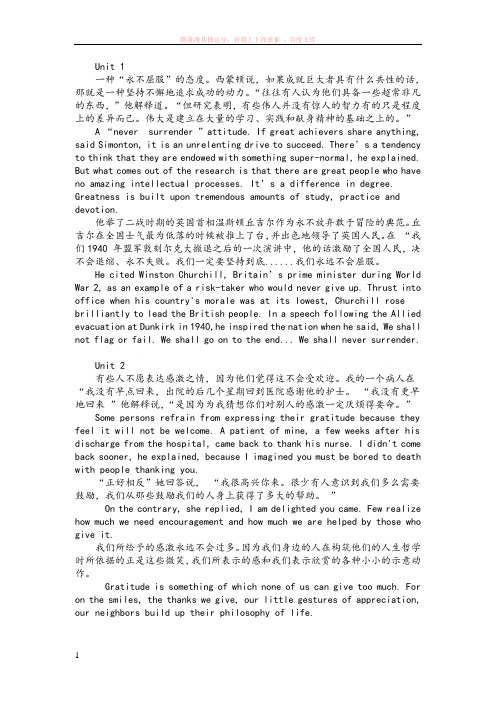
一种“永不屈服”的态度。
西蒙顿说,如果成就巨大者具有什么共性的话,那就是一种坚持不懈地追求成功的动力。
“往往有人认为他们具备一些超常非凡的东西,”他解释道。
“但研究表明,有些伟人并没有惊人的智力有的只是程度上的差异而已。
伟大是建立在大量的学习、实践和献身精神的基础之上的。
”A “never surrender ”attitude. If great achievers share anything, said Simonton, it is an unrelenting drive to succeed. There’s a tendency to think that they are endowed with something super-normal, he explained. But what comes out of the research is that there are great people who have no amazing intellectual processes. It’s a difference in degree. Greatness is built upon tremendous amounts of study, practice and devotion.他举了二战时期的英国首相温斯顿丘吉尔作为永不放弃敢于冒险的典范。
丘吉尔在全国士气最为低落的时候被推上了台,并出色地领导了英国人民。
在“我们1940 年盟军敦刻尔克大撤退之后的一次演讲中,他的话激励了全国人民,决不会退缩、永不失败。
我们一定要坚持到底......我们永远不会屈服。
He cited Winston Churchill, Britain’s prime minister during World War 2, as an example of a risk-taker who would never give up. Thrust into office when his country's morale was at its lowest, Churchill rose brilliantly to lead the British people. In a speech following the Allied evacuation at Dunkirk in 1940,he inspired the nation when he said, We shall not flag or fail. We shall go on to the end... We shall never surrender.Unit 2有些人不愿表达感激之情,因为他们觉得这不会受欢迎。
21世纪大学英语教程(第四册)Unit1课文原文
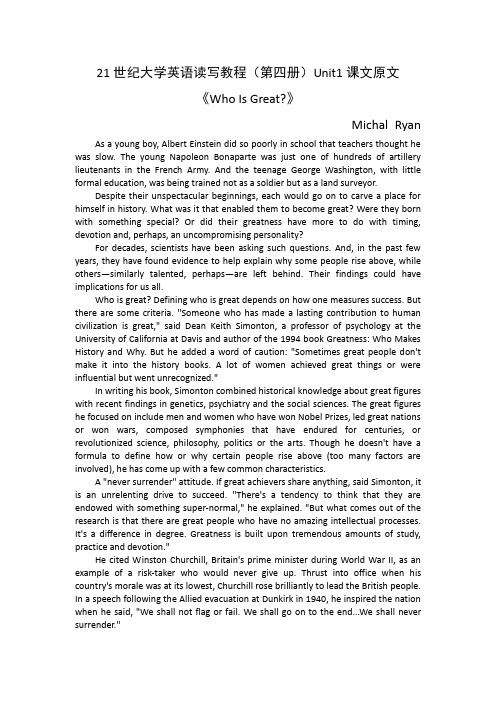
21世纪大学英语读写教程(第四册)Unit1课文原文《Who Is Great?》Michal Ryan As a young boy, Albert Einstein did so poorly in school that teachers thought he was slow. The young Napoleon Bonaparte was just one of hundreds of artillery lieutenants in the French Army. And the teenage George Washington, with little formal education, was being trained not as a soldier but as a land surveyor.Despite their unspectacular beginnings, each would go on to carve a place for himself in history. What was it that enabled them to become great? Were they born with something special? Or did their greatness have more to do with timing, devotion and, perhaps, an uncompromising personality?For decades, scientists have been asking such questions. And, in the past few years, they have found evidence to help explain why some people rise above, while others—similarly talented, perhaps—are left behind. Their findings could have implications for us all.Who is great? Defining who is great depends on how one measures success. But there are some criteria. "Someone who has made a lasting contribution to human civilization is great," said Dean Keith Simonton, a professor of psychology at the University of California at Davis and author of the 1994 book Greatness: Who Makes History and Why. But he added a word of caution: "Sometimes great people don't make it into the history books. A lot of women achieved great things or were influential but went unrecognized."In writing his book, Simonton combined historical knowledge about great figures with recent findings in genetics, psychiatry and the social sciences. The great figures he focused on include men and women who have won Nobel Prizes, led great nations or won wars, composed symphonies that have endured for centuries, or revolutionized science, philosophy, politics or the arts. Though he doesn't have a formula to define how or why certain people rise above (too many factors are involved), he has come up with a few common characteristics.A "never surrender" attitude. If great achievers share anything, said Simonton, it is an unrelenting drive to succeed. "There's a tendency to think that they are endowed with something super-normal," he explained. "But what comes out of the research is that there are great people who have no amazing intellectual processes. It's a difference in degree. Greatness is built upon tremendous amounts of study, practice and devotion."He cited Winston Churchill, Britain's prime minister during World War II, as an example of a risk-taker who would never give up. Thrust into office when his country's morale was at its lowest, Churchill rose brilliantly to lead the British people. In a speech following the Allied evacuation at Dunkirk in 1940, he inspired the nation when he said, "We shall not flag or fail. We shall go on to the end...We shall never surrender."Can you be born great? In looking at Churchill's role in history—as well as the roles of other political and military leaders—Simonton discovered a striking pattern: "Firstborns and only children tend to make good leaders in time of crisis: They're used to taking charge. But middle-borns are better as peacetime leaders: They listen to different interest groups better and make the necessary compromises. Churchill, an only child, was typical. He was great in a crisis, but in peacetime he was not effective—not even popular."Timing is another factor. "If you took George Washington and put him in the 20th century he would go nowhere as a politician," Simonton declared. "He was not an effective public speaker, and he didn't like shaking hands with the public. On the other hand, I'm not sure Franklin Roosevelt would have done well in Washington's time. He wouldn't have had the radio to do his fireside chats."Can you be too smart? One surprise among Simonton's findings is that many political and military leaders have been bright but not overly so. Beyond a certain point, he explained, other factors, like the ability to communicate effectively, become more important than innate intelligence as measured by an IQ test. The most intelligent U.S. Presidents, for example—Thomas Jefferson, Woodrow Wilson and John F. Kennedy—had a hard time getting elected, Simonton said, while others with IQs closer to the average (such as Warren G. Harding) won by landslides. While political and economic factors also are involved, having a genius IQ is not necessary to be a great leader.In the sciences, those with "genius level" IQs do have a better chance at achieving recognition, added Simonton. Yet evidence also indicates that overcoming traditional ways of thinking may be just as important.He pointed to one recent study where college students were given a set of data and were asked to see if they could come up with a mathematical relation. Almost a third did. What they did not know was that they had just solved one of the most famous scientific equations in history: the Third Law of Planetary Motion, an equation that Johannes Kepler came up with in 1618.Kepler's genius, Simonton said, was not so much in solving a mathematical challenge. It was in thinking about the numbers in a unique way—applying his mathematical knowledge to his observations of planetary motion. It was his boldness that set him apart.Love your work. As a child, Einstein became fascinated with the way magnets are drawn to metal. "He couldn't stop thinking about this stuff," Simonton pointed out. "He became obsessed with problems in physics by the time he was 16, and he never stopped working on them. It's not surprising that he made major contributions by the time he was 26.""For most of us, it's not that we don't have the ability," Simonton added, "it's that we don't devote the time. You have to put in the effort and put up with all the frustrations and obstacles."Like other creative geniuses, Einstein was not motivated by a desire for fame, said Simonton. Instead, his obsession with his work was what set him apart.Where such drive comes from remains a mystery. But it is found in nearly allcreative geniuses—whether or not their genius is acknowledged by contemporaries."Emily Dickinson was not recognized for her poetry until after her death," said Simonton. "But she was not writing for fame. The same can be said of James Joyce, who didn't spend a lot of time worrying about how many people would read Finnegans Wake."Today, researchers have evidence that an intrinsic passion for one's work is a key to rising above. In a 1985 study at Brandeis University conducted by Teresa Amabile, now a professor of business administration at Harvard University, a group of professional writers—none famous—were asked to write a short poem. Each writer was then randomly placed in one of three groups: One group was asked to keep in mind the idea of writing for money; another was told to think about writing just for pleasure; and a third group was given no instruction at all.The poems then were submitted anonymously to a panel of professional writers for evaluation. The poetry written by people who thought about writing for money ranked lowest. Those who thought about writing just for pleasure did the best. "Motivation that comes from enjoying the work makes a significant difference, "Amabile said.。
21世纪大学英语读写教程第四册全文Unit3
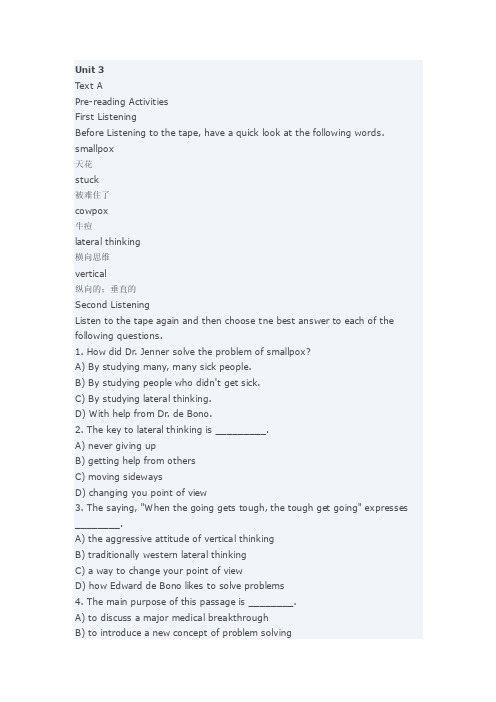
Unit 3Text APre-reading ActivitiesFirst ListeningBefore Listening to the tape, have a quick look at the following words. smallpox天花stuck被难住了cowpox牛痘lateral thinking横向思维vertical纵向的;垂直的Second ListeningListen to the tape again and then choose tne best answer to each of the following questions.1. How did Dr. Jenner solve the problem of smallpox?A) By studying many, many sick people.B) By studying people who didn't get sick.C) By studying lateral thinking.D) With help from Dr. de Bono.2. The key to lateral thinking is _________.A) never giving upB) getting help from othersC) moving sidewaysD) changing you point of view3. The saying, "When the going gets tough, the tough get going" expresses ________.A) the aggressive attitude of vertical thinkingB) traditionally western lateral thinkingC) a way to change your point of viewD) how Edward de Bono likes to solve problems4. The main purpose of this passage is ________.A) to discuss a major medical breakthroughB) to introduce a new concept of problem solvingC) to talk about the life of Edward de BonoD) to contrast Eastern and Western ways of thinkingHow to Change Your Point of ViewCaroline SeebohmDr. Edward Jenner was busy trying to solve the problem of smallpox. After studying case after case, he still found no possible cure. He had reached an impasse in his thinking. At this point, he changed his tactics. Instead of focusing on people who had smallpox, he switched his attention to people who did not have smallpox. It turned out that dairymaids apparently never got the disease. From the discovery that harmless cowpox gave protection against deadly smallpox came vaccination and the end of smallpox as a scourge in the western world.We often reach an impasse in our thinking. We are looking at a problem and trying to solve it and it seems there is a dead end. It is on these occasions that we become tense, we feel pressured, overwhelmed, in a state of stress. We struggle vainly, fighting to solve the problem.Dr. Jenner, however, did something about this situation. He stopped fighting the problem and simply changed his point of view—from his patients to dairy maids. Picture the process going something like this: Suppose the brain is a computer. This computer has absorbed into its memory bank all your history, your experiences, your training, your information received through life; and it is programmed according to all this data. To change your point of view, you must reprogramme your computer, thus freeing yourself to take in new ideas and develop new ways of looking at things. Dr. Jenner, in effect, by reprogramming his computer, erased the old way of looking at his smallpox problem and was free to receive new alternatives.That's all very well, you may say, but how do we actually do that?Doctor and philosopher Edward de Bono has come up with a technique for changing our point of view, and he calls it Lateral Thinking.The normal Western approach to a problem is to fight it. The saying, "When the going gets tough, the tough get going," is typical of this aggressive attitude toward problem-solving. No matter what the problem is, or the techniques available for solving it, the framework produced by our Western way of thinking is fight. Dr. de Bono calls this vertical thinking; the traditional, sequential, Aristotelian thinking of logic, moving firmly from one step to the next, like toy blocks being built one on top of the other. The flaw is, of course, that if at any point one of the steps is not reached, or one of the toy blocks is incorrectlyplaced, then the whole structure collapses. Impasse is reached, and frustration, tension, feelings of fight take over.Lateral thinking, Dr. de Bono says, is a new technique of thinking about things—a technique that avoids this fight altogether, and solves the problem in an entirely unexpected fashion.In one of Sherlock Holmes's cases, his assistant, Dr. Watson, pointed out that a certain dog was of no importance to the case because it did not appear to have done anything. Sherlock Holmes took the opposite point of view and maintained that the fact the dog had done nothing was of the utmost significance, for it should have been expected to do something, and on this basic he solved the case.Lateral thinking sounds simple. And it is. Once you have solved a problem laterally, you wonder how you could ever have been hung up on it. The key is making that vital shift in emphasis, that sidestepping of the problem, instead of attacking it head-on.Dr. A. A. Bridger, psychiatrist at Columbia University and in private practice in New York, explains how lateral thinking works with his patients. "Many people come to me wanting to stop smoking, for instance," he says. "Most people fail when they are trying to stop smoking because they wind up telling themselves, 'No, I will not smoke; no, 1 shall not smoke; no, I will not; no, I cannot...' It's a fight and what happens is you end up smoking more.""So instead of looking at the problem from the old ways of no, and fighting it, I show them a whole new point of view—that you are your body's keeper, and your body is something through which you experience life. If you stop to think about it, there's really something helpless about your body. It can do nothing for itself. It has no choice, it is like a baby's body. You begin then a whole new way of looking at it—‘I am now going to take care of myself, and give myself some respect and protection, by not smoking.'“There is a Japanese parable about a donkey tied to a pole by a rope. The rope rubs tight against his neck. The more the donkey fights and pulls on the rope, the tighter and tighter it gets around his throat—until he winds up dead. On the other hand, as soon as he stops fighting, he finds that the rope gets slack, he can walk around, maybe find some grass to eat...That's the same principle: The more you fight something the more anxious you become—the more you're involved in a bad pattern, the more difficult it is to escape pain."Lateral thinking," Dr. Bridger goes on, "is simply approaching a problem with what I would call an Eastern flanking maneuver. You know, when a zen archerwants to hit the target with a bow and arrow, he doesn't concentrate on the target, he concentrates rather on what he has in his hands, so when he lets the arrow go, his focus is on the arrow, rather than the target. This is what an Eastern flanking maneuver implies—instead of approaching the target directly, you approach it from a sideways point of view—or laterally instead of vertically." "I think the answer lies in that direction," affirms Dr. Bridger. "Take the situation where someone is in a cris is. The Chinese word for crisis is divided into two characters, one meaning danger and the other meaning opportunity. We in the Western world focus only upon the ‘danger' aspect of crisis. Crisis in Western civilization has come to mean danger, period. And yet the word can also mean opportunity. Let us now suggest to the person in crisis that he cease concentrating so upon the dangers involved and the difficulties, and concentrate instead upon the opportunity—for there is always opportunity in crisis. Looking at a crisis from an opportunity point of view is a lateral thought."(1 100 words)。
21世纪大学英语读写教程第四册课后习题答案(全)

IX
BCBAD DCABA DABCA
X
西蒙顿说,如果事业上取得巨大成就者具有什么共性的话,那就是一种持续不断地追求成功的动力。“人们往往认为他们天生具有一些超常非凡的东西,”他解释道。“但研究结果表明,有的伟人并没有惊人的智力。有的只是程度上的差异而已。伟大是建立在大量的学习、实践和献身精神的基础之上的。”他举出二战时期的英国首相温斯顿?丘吉尔作为一个永不放弃的冒险者的典范。丘吉尔在全国上下士气最为低落的时候被推上台,并出色地领导了英国人民。在1940年盟军敦刻尔克大撤退之后的一次演讲中,他的话激励了全国人民,“我们绝不会衰退、失败。我们将坚持到底……我们永远不会屈服。”
Unit one
TEXT A
II
1.He defines greatness as the lasting contribution which a person makes or has made to human civilization.
2.The example of Churchill shows the importance of persistence and dedication in achieving greatness.
XI
1.Americans tend to define people by the jobs they have/do. Such characteristics as their family and educational backgrounds are considered less important.
4.Some actors fame is built on their innate beauty, but despite his short stature, Dustin Hoffman rose above and it is his excellent acting that set him apart.
读写课 第四册课文Unit 3 Text A

Unit 3Text A Fred Smith and FedEx: The vision that changed the world弗雷德•史密斯与联邦快递:一个改变了世界的创想1 Every night several hundred planes bearing a purple, white, and orange design touch down at Memphis Airport, in Tennessee. What precedes this landing are package pick-ups from locations all over the United States earlier in the day. Crews unload the planes' cargo of more than half a million parcels and letters. The rectangular packages and envelopes are rapidly reshuffled and sorted according to address, then loaded onto other aircraft, and flown to their destinations to be dispersed by hand — many within 24 hours of leaving their senders. This is the culmination of a dream of Frederick W. Smith, the founder, president, chief executive officer, and chairman of the board of the FedEx Corp. — known originally as Federal Express — the largest and most successful overnight delivery service in the world. Conceived when he was in college and now in its 28th year of operation, Smith's exquisite brainchild has become the standard for door-to-door package delivery.2 Recognized as an outstanding entrepreneur with an agreeable and winning personality, Smith is held in high regard by his competitors as well as his employees and stockholders. Fred Smith was just 27 when he founded FedEx. Now, so many years later, he's still the "captain of the ship". He attributes the success of the company simply to leadership, something he deduced from his years in the military, and from his family.3 Frederick Wallace Smith was born into a wealthy family clan on August 11, 1944 in Mississippi. His father died when he was just four years old. As a juvenile, Smith was an invalid, suffering from a disease that left him unable to walk normally. He was picked on by bullies, and he learned to defend himself by swinging at them with his alloy walking stick. Cured of the disease by the age of l0, he became a star athlete in high school, playing football, basketball, and baseball.4 Smith's passion was flying. At 15, he was operating a crop-duster over the skyline of the Mississippi Delta, a terrain so flat that there was little need for radar navigation. As a student at Yale University, he helped revive the Yale flying club; its alumni had populated naval aviation history, including the famous "Millionaires' Unit" in World War I. Smith administrated the club's business end and ran a small charter operation in New Haven.5 With his study time disrupted by flying, his academic performance suffered, but Smith never stopped looking for his own "big idea". He thought he had found it when he wrote a term paper for an economics class. He drafted a prototype fora transportation company that would guarantee overnight delivery of small, time-sensitive goods, such as replacement parts and medical supplies, to major US regions. The professor wasn't impressed and told Smith he couldn't quantify the idea and clearly it wasn't feasible.6 However, Smith was certain he was onto something, even though several more years elapsed before he could turn his idea into reality. In the interim, he graduated from Yale in 1966, just as America's involvement in the Vietnam War was deepening. Since he was a patriot and had attended officers' training classes, he joined the Marines.7 Smith completed two tours in Vietnam, eventually flying more than 200 missions. "In the military, leadership means getting a group of people to subordinate their individual desires and ambitions for the achievement of organizational goals," Smith says, fusing together his military and business experiences. "And good leadership has very measurable effects on a company's bottom line."8 Home from Vietnam, Smith became fascinated by the notion that if you connected all the points of a network through an intermediary hub, the streamlined efficiency could be enormous compared to other disjointed, decentralized businesses, whether the system involved moving packages and letters or people and planes. He decided to take a stab at starting his own business. With an investment from his father's company, as well as a chunk of his own inheritance, Smith bought his first delivery planes and in 1971 formed the Federal Express.9 The early days were underscored by extreme frugality and financial losses. It was not uncommon for FedEx drivers to pay for gasoline for their vans out of their own pockets. But despite such problems, Smith showed concern for the welfare of his employees. Just as he recalled, even when they didn't have the money, even when there weren't couches in the office and electric typewriters, they still set the precedent to ensure a good medical and dental plan for their people.10 Along the way, FedEx pioneered centralization and the "hub and spoke" system, which has since been adopted by almost all major airlines. The phrase FedEx it has become a fixture in our language as much as Xerox or Google.11 Smith says success in business boils down to three things. First, you need to have appealing product or service and a compelling strategy. Then you need to have an efficient management system. Assuming you have those things, leading a team is the single most important issue in running an organization today.12 Although Smith avoids the media and the trappings of public life, he is saidto be a friendly and accessible employer. He values his people and never takes them for granted. He reportedly visits FedEx's Memphis site at night from time to time and addresses sorters by name. For years he extended an offer to any courier with 10 years of service to come to Memphis for an "anniversary breakfast". That embodies Fred Smith's philosophy: People, Service, Profit (P-S-P). Smith says, "The P-S-P philosophy is like an unbroken circle or chain. There are no clearly definable points of entry or exit. Each link upholds the others and is, in turn, supported by them." In articulating this philosophy and in personally involving himself in its implementation, Frederick Smith is the forerunner of the new sphere of leadership that success in the future will demand.。
大学英语读写课第四册text a Unit8 Contents(1)

5.What caused Mrs.Mallard’s death,according to the doctor?
• According to the doctor,Mrs.Mallard died of heart failure caused by the joy of seeing her husband still alive.
2.What was Mrs.Mallard’s first reaction towards her husband’s assumed death?
After hearing her husband ’ s assumed death,Mrs.Mallard wept in grief and then locked herself in her room alone.
1
1~8
2
9~17
3
18~23
True or False • 1.Mrs.Mallard was longing for a happy life and her ordinary life is not satisfying.( T )
Paragraph4.5.8
• 2.Mrs.Mallard was trying her best not to have that kind of feeling with her will, but she failed.( T) • 3.People always believed that the husband had the right to impose one’s own will upon the wife, and now such powerful will still existed.( F ) • 4.When the feeling finally came,she said the word"free" loudly for only once.( F )
21世纪大学英语(读写教程)第四册课文全翻译

如何变得有天赋朱利叶斯·法斯特芭芭拉·法斯特在一项对教育方法的研究中,一位教师被告知她的新班中全是有非凡天赋的孩子。“你应该从他们那儿获得高于平均水平的成绩,”有人这样通知她,而到了期末她所得到的正是这个——超出平均水平的成绩。这件事的引人注目之处在于事实上这个班的学生并非异乎寻常。他们只是一群中等水平的、智商处于正常范围之内的学生。这位老师被告知的并不是他们真实的潜力。这项研究揭示了许多关于教学和孩子问题的许多答案,但它留下的未回答的问题更多。但它的确非常清晰地表明了一点,即当一个孩子相信老师的期望是真诚的时候,他通常是不会辜负这种期望的。一个没有回答的问题是:那位老师是以什么方式向学生们表明他们是特殊的,能取得优异成绩的呢?她没有用许多话告诉他们这一点,但显然在她的态度中有某种东西使学生们确信他们是有非凡天赋的。进一步的研究表明,老师态度中那种特别的“东西”,一部分是她给全班布置的作业,一部分是她布置作业的方式。但最强有力的“东西”还是老师本人和她对全班学生及其能力的态度。当她说“你们是聪明的孩子”时,她的声音中有更多的信心和关注。一直有一种鼓励性的语气在告诉他们他们会取得进步,很大的进步。孩子们收到了这些信号,并对它们作出了积极的反应。某个学生的成绩达不到老师的期望是常有的事。当这种情况发生时,那个学生面对的不是失望、愤怒或恼怒。相反,老师认为这是一次例外,一件偶然的事情,倒霉的一天,一次暂时的失误——而学生相信了她,并消除了疑虑。下一次,他更加努力了,决心做到老师知道他能做到的事。很难精确地确定老师传达的信息:“我期待着最好的成绩,”中到底是哪一部分告诉了孩子。它的一部分包括显示信心的平和语调,言语上的耐心,及没有讽刺、贬低和恼怒等消极因素。期待着最好成绩的老师满怀信心地提问,因为她知道她得到的答案将是正确的,而孩子也感受到了那种信心。这一信息大多是通过声音传递的,但也有相当惊人的一部分表现在态度、接触和面部表情上。跟这个对“天才”儿童所做的实验相类似的实验也在“天才”老鼠的身上做了。一位科学家得到的是一群普通的老鼠,但却被告知它们是一个特殊的品种,曾接受过在创记录的时间里穿越迷宫的训练。在与这些老鼠一起工作时,这位科学家发现它们确实比其他老鼠学得快,穿越迷宫也的确更迅速。但是老鼠对我们的语言一无所知。那位科学家是怎样得以将他的期望传达给它们的呢?对实验中所有变量的检查表明,这些异常好的结果应归功于他对待老鼠的方式,他对它们讲话的方式和语调,他声音中的信心、安抚和确定无疑。老鼠理解了所有的信息,并照着做了。从更广泛的角度看这两个实验,那位老师和那位科学家都运用了一个对所有社会各个阶层的人都通用的原则——贴标签原则。我们所有的期待都带有偏见,我们对于不同的人有着完全不同的期望,甚至对各个民族也是如此。我们依据民族特点来判断人。我们认为美国人贪婪,想赚大钱,我们在心里给他们贴上了这样的标签。我们给德国人贴的标签是整洁而有条理,英国人是冷漠、不友好和矝持寡言,意大利人是易动感情,日本人彬彬有礼——等等等等。我们在一个非常宽阔的、远非同质的群体上贴了一张非常狭小的标签。我们在种族层面上也是这样。黑人有音乐感,印第安人坚忍,东方人神秘莫测。我们甚至给性别贴上标签——男人积极进取、女人消极被动。在家庭层面上,标签有时是由邻居们贴上的。“琼斯一家都是废物……总是依靠救济。”有时标签也许是由那家人自己贴的。“我们史密斯一家宁愿挨饿也不会请求政府帮助!”史密斯家的男孩因带着这个令人敬畏的独立标签长大,很容易与自己的标签名实相符,正如琼斯家的女孩很容易与她的标签名实相符一样:“他们都认为我们是废物?那我就表现得像废物!”这种标签也许不太全面,甚至带有性别歧视。某个家庭也许会自豪地说,“我们家的男人一直都是专业人员。”当这个家庭里的一个儿子比尔发现木工活是他最喜爱的工作时,他便面对着同家庭的冲突——以及同自己的冲突。他内心的力量也许能使他按照自己的意愿坚持到底,成为一个木匠,但另一方面他也知道他没有符合家庭的标签,因此他怀着一种负罪感度过一生。他甚至可能给自己创造标签。“我是一个失败者,真的。”即使比尔在自己这一行里是个成功者,经过一段时间以后拥有了自己的企业,比他当律师的兄弟鲍勃赚的钱还多,那也没用。比尔仍然不是一个专业人员,因此他内心的标签上仍然写着失败。在家庭内部贴标签很早便开始了。在宝宝听得懂口头语言之前,他便能对肢体语言和间接交流作出反应了。他在懂得词语之前,已经从父母的声音中感受到爱,他也感受到嫌弃、冷淡、恐惧或敌意,他也对这些情绪作出了反应。如果他得到的是爱和温柔,他也以爱和温柔作出反应。以后,当他理解言语时,他便接受他的标签。吉米是家里的乖孩子,而一向难弄的莎莉则得到了惹是生非者的标签。每个孩子除了名字外还得到一个标签。她是聪明的。他爱出风头。诺曼老是迟到。贝蒂不招人爱。芭芭拉很冷漠。杰克很野。纳塔莉很甜,等等等等。这些标签也许反映了事实。纳塔莉也许很甜,但往往是标签把现实强加于孩子身上。如果纳塔莉经常听到别人说她很甜,她便开始表现得很甜。你往往会使自己与你的标签名实相符。同样,参加教学实验的学生们被加上了聪明的标签,于是他们便设法变得聪明,超常地发挥了他们的许多当面或在电视上听我讲话的人,或者那些读到我讲话的人都以为我的学历远远不止八年级。这一印象完全归功于我在监狱中的学习。这是在查尔斯顿监狱真正开始的,当时宾比第一次让我对他渊博的知识感到了羡慕。无论参与什么交谈,宾比总是起着主导作用,而我也曾经试图效仿他。但我找到的每本书中,几乎每句句子都有一个以上甚至几乎全部的单词我压根儿不认识。当我跳过那些词时,我最终当然不知道书中所云。所以我来到诺福克监狱时,仍然只有看看书的意愿。要不是我后来获得了动力,我本来很快就会连这些愿望也丢弃的。我明白我最好是能弄到一本字典——为的是学习,学一些单词。幸好我还想到应该努力提高一下自己的书写水平。我的书写很糟糕,甚至于不能将字写在一条直线上。这两个想法促使我要求诺福克监狱学校给我一本字典以及一些便笺簿和铅笔。头两天我还拿不定主意,只是随便翻了翻字典。我从来没有意识到会有这么多单词!我不知道哪些词是我需要学习的。最后,为了开始某种行动,我便开始了抄写。我把印在第一页上的所有东西甚至标点符号,慢慢地、费力地、歪歪斜斜地抄到了我的便笺簿里。我记得那花了我一天的时间。然后,我便把写在便笺簿上的每个词大声读给自己听。我一遍又一遍地把自己写的东西大声读给自己听。第二天早上醒来时我还想着那些词——我无比自豪地意识到,我不仅一下子写了那么多,还写了许多我从来不知道存在于这个世界上的词。而且,我稍微动一下脑筋还能记得其中许多词的意思。我复习了那些被我忘记了意思的单词。有趣的是,就在此刻,词典第一页上的“土豚”一词竟跳入了我的脑海之中。字典上有它的一幅插图,一种长尾、长耳、会挖洞的非洲哺乳动物,以白蚁为食,像食蚁动物捕食蚂蚁那样伸出舌头来捕食白蚁。我完全被迷住了,于是又继续干下去——我抄写了字典的下一页。当我学习它时我获得了同样的体验。随着以后的每一页,我还了解了人物、地方和历史事件。实际上字典就像一部小型百科全书。最后,字典的A部分抄满了一整本便笺簿——于是我便继续抄写B部分。我就这样开始抄写了整本字典。如此多的实践帮我提高了书写速度,所以以后我抄得快多了。包括我写在便笺簿上的词和写的信,我猜我在后来的囚禁日子里足足写下了一百万词。我认为随着词汇量的增加,我肯定能第一次拿起一本书来读并开始理解书中讲的内容了。任何一个博览群书的人都能想象得出那个被打开的新世界。让我告诉你一些事;从那以后直到我离开那所监狱,在我的每一段空闲时间里,我不是在图书馆里看书,就是在我的床上看书。你哪怕用楔子也休想把我跟书分开。我学习穆罕默德先生的教导,我跟别人通信,我会客,我读书,日子就这样一个月一个月地过去了,我甚至没有想到自己是在坐牢。事实上,在那之前,我在生活中从来没有那样真正自由过……正如你能想象的,尤其在一个特别强调改造的监狱里,如果一个犯人表现出对书籍异乎寻常的强烈兴趣,他就会受到赞许。犯人中有相当多的博览群书者,尤其是受广欢迎的辩论家。一些人被公认为活的百科全书。他们几乎成了名人。当这个新世界,这个能够阅读并理解的新世界向我敞开时,我贪婪地阅读文学作品,数量之多超过了任何一所大学对任何一个学生的要求。我在自己的房间里比在图书馆里读得更多。一个以读书多而出名的犯人能超出规定借出更多的书。我更喜欢在与外界完全隔绝的自己的房间里读书。当我发展到开始读非常严肃的读物时,每天晚上10点左右,我会因为“熄灯”而愤怒不已。它似乎总是在我正读到引人入胜之处时来跟我捣乱。幸好在我的门外面有一盏走廊灯把光线照到我的房间里。一旦我的眼睛适应之后,这点光线就足以让我读书。所以“熄灯”后,我就坐在地板上,借着那点光继续读书。夜间看守每隔一小时就走过每个房间。每次听到越来越近的脚步声,我就跳到床上假装睡觉。看守一走过去,我就从床上回到地板上那块亮的地方,再读上58分钟——直到看守再次走过来。这样一直持续到每天凌晨三四点钟。每天晚上睡三四个小时对我来说就足够了。在流落街头的那些日子里我经常睡得更少。我经常思考阅读为我打开的那些新的远景。我当时在狱中就知道,阅读已永远改变了我的人生历程。正如我现在所认识到的,阅读能力唤醒了在我内心潜伏已久的对于思想活跃的渴望。我当然不是在追求任何学位,那只是大学授予学生一种地位象征的方式。我通过自学所受到的教育使我每读一本新书就更意识到正在折磨着美国黑色人种的聋、哑和盲。不久前,一位英国作家从伦敦打来电话问了我几个问题。其中一个问题是,“你的母校是哪儿?”我告诉他,“是书。”在任何一个空闲的十五分钟里,你都会发现我在学习一些我觉得可能有助于黑人的东西……每次乘飞机,我都带一本想读的书——至今已读了很多书。如果我现在不是每天出来同白人斗争,我会将余生用于阅读,仅仅是为了满足我的好奇心——因为你几乎说不出什么东西是我不感到好奇的。 我想任何人都没有像我那样从坐牢中获得了那么多。事实上,如果我的生活是另一个样子,如果我上了大学,我就不能像在监狱里那样能更集中地进行学习。我想上大学最大的麻烦之一就是有太多让人分心的事。除了监狱还有什么地方能让我有时候每天集中学习15个小时来克服我的愚昧无知呢?
21世纪大学英语读写教程第四册答案解析与课文翻译
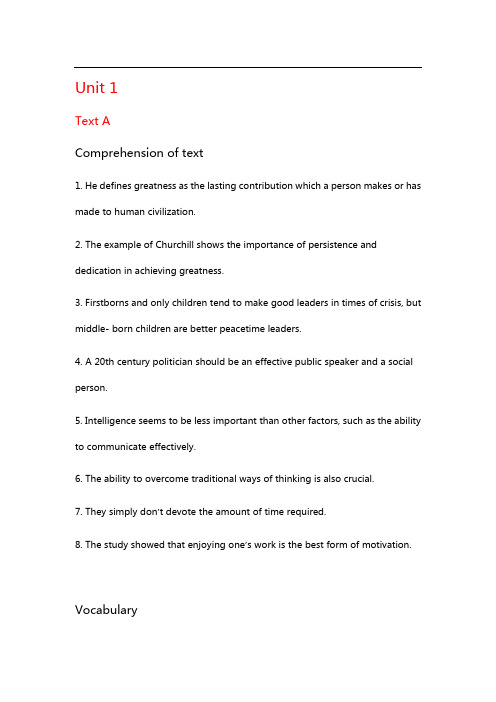
Unit 1Text AComprehension of text1. He defines greatness as the lasting contribution which a person makes or has made to human civilization.2. The example of Churchill shows the importance of persistence and dedication in achieving greatness.3. Firstborns and only children tend to make good leaders in times of crisis, but middle- born children are better peacetime leaders.4. A 20th century politician should be an effective public speaker and a social person.5. Intelligence seems to be less important than other factors, such as the ability to communicate effectively.6. The ability to overcome traditional ways of thinking is also crucial.7. They simply don’t devote the amount of time required.8. The study showed that enjoying one’s work is the best form of motivation. Vocabulary1 chat 2.acknowledge 3.motivated 4.charcteristic 5 despite 6.influential 7.cited 8.obstacle9 intrinsic 10.criteria 11.obsession 12.innate13 contribution(s) 14.contemporary 15.submitted 16.morale1 left behind 2.rise 3.made history 4.were endowed with 5 put up with 6.going nowhere 7.ifocuses on 8.be built on9 put in e up with 11.take charge 12.set...apartWord buildingefficiency emergency fluency frequencyproficiency tendency urgency sufficiency1 fluency 2.proficiency 3.emergency4.Efficiency 5 tendency 6.frequencyStructure1. For some students, it's not that they don't put in enough time — it's that they don’t have good study habits.2. Children perform differently at school. It's not that they have different IQs —it's that they are brought up in different environments.3. The company is not very productive. It's not that its staff aren't talented — it's that their energy hasn't been channeled effectively.4. I’m really sorry. It's not that I don't want to go to the cinema with you— it's that I have to finish my paper tonight.5. You have a stomachache. It's not that the food was bad — it's probably that you have too much stress from your work.1. President Wilson didn't try to bring the US back to economic and political isolation. Instead, he believed in international cooperation through an association of nations.puters don't teach students in groups. Instead, they can help them learn effectively according to their different needs.3. We shouldn't focus on minor points. Instead, we should try to solve the problem of the greatest urgency at present.4. He doesn’t get anybody else to help him. Instead, he likes to attend to everything himself.5. Teaching success shouldn't be measured by the scores the students receive on tests. Instead, it should be measured by whether the students have internalized the ability and desire to learn.Close1-5 BCBAD6-10 DCABA11-15 DABCATransition西蒙顿说,如果事业上取得巨大成就者具有什么共性的话,那就是一种持续不断地追求成功的动力。
21世纪大学英语读写教程第四册标准答案及课文翻译
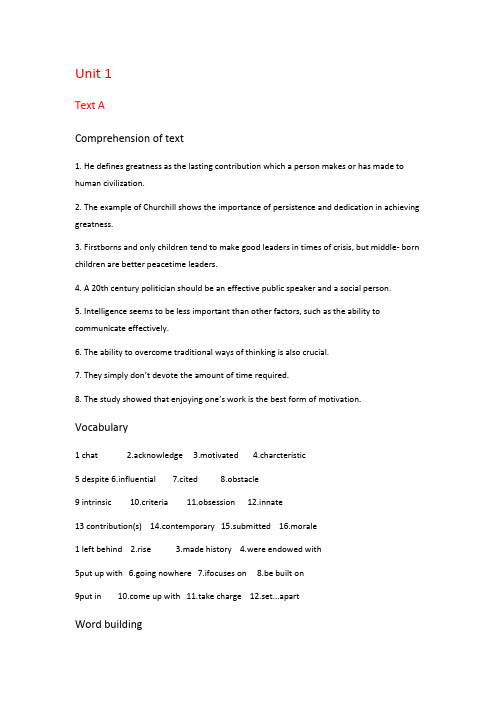
Unit 1Text AComprehension of text1. He defines greatness as the lasting contribution which a person makes or has made to human civilization.2. The example of Churchill shows the importance of persistence and dedication in achieving greatness.3. Firstborns and only children tend to make good leaders in times of crisis, but middle- born children are better peacetime leaders.4. A 20th century politician should be an effective public speaker and a social person.5. Intelligence seems to be less important than other factors, such as the ability to communicate effectively.6. The ability to overcome traditional ways of thinking is also crucial.7. They simply don’t devote the amount of time required.8. The study showed that enjoying one’s work is the best form of motivation. Vocabulary1 chat 2.acknowledge 3.motivated 4.charcteristic5 despite 6.influential 7.cited 8.obstacle9 intrinsic 10.criteria 11.obsession 12.innate13 contribution(s) 14.contemporary 15.submitted 16.morale1 left behind 2.rise 3.made history 4.were endowed with5put up with 6.going nowhere 7.ifocuses on 8.be built on9put in e up with 11.take charge 12.set...apartWord buildingefficiency emergency fluency frequencyproficiency tendency urgency sufficiency1 fluency2.proficiency 3.emergency 4.Efficiency 5 tendency 6.frequency Structure1. For some students, it's not that they don't put in enough time —it's that they don’t have good study habits.2. Children perform differently at school. It's not that they have different IQs — it's that they are brought up in different environments.3. The company is not very productive. It's not that its staff aren't talented — it's that their energy hasn't been channeled effectively.4. I’m really sorry. It's not that I don't want to go to the cinema with you— it's that I have to finish my paper tonight.5. You have a stomachache. It's not that the food was bad — it's probably that you have too much stress from your work.1. President Wilson didn't try to bring the US back to economic and political isolation. Instead, he believed in international cooperation through an association of nations.puters don't teach students in groups. Instead, they can help them learn effectively according to their different needs.3. We shouldn't focus on minor points. Instead, we should try to solve the problem of the greatest urgency at present.4. Hedoesn’t get anybody else to help him. Instead, he likes to attend to everything himself.5. Teaching success shouldn't be measured by the scores the students receive on tests. Instead, it should be measured by whether the students have internalized the ability and desire to learn.Close1-5 BCBAD6-10 DCABA11-15 DABCATransition西蒙顿说,如果事业上取得巨大成就者具有什么共性的话,那就是一种持续不断地追求成功的动力。
21世纪大学英语读写教程第四册课后答案及翻译
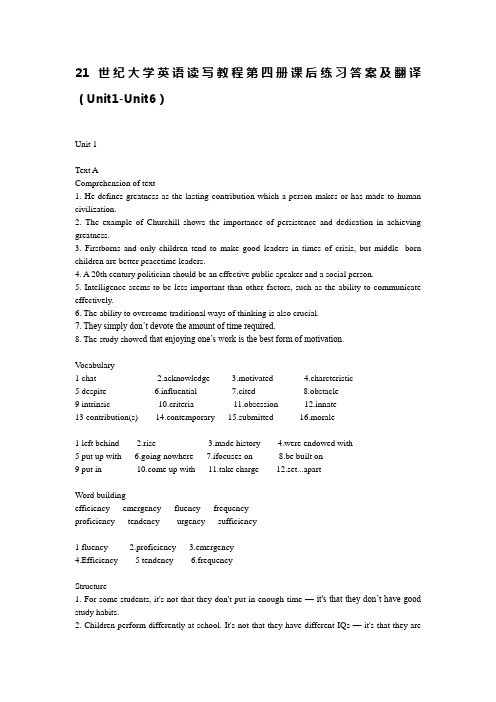
21世纪大学英语读写教程第四册课后练习答案及翻译(Unit1-Unit6)Unit 1Text AComprehension of text1. He defines greatness as the lasting contribution which a person makes or has made to human civilization.2. The example of Churchill shows the importance of persistence and dedication in achieving greatness.3. Firstborns and only children tend to make good leaders in times of crisis, but middle- born children are better peacetime leaders.4. A 20th century politician should be an effective public speaker and a social person.5. Intelligence seems to be less important than other factors, such as the ability to communicate effectively.6. The ability to overcome traditional ways of thinking is also crucial.7. They simply don‟t devote the amount of time required.8. The study showe d that enjoying one‟s work is the best form of motivation.V ocabulary1 chat 2.acknowledge 3.motivated 4.charcteristic5 despite 6.influential 7.cited 8.obstacle9 intrinsic 10.criteria 11.obsession 12.innate13 contribution(s) 14.contemporary 15.submitted 16.morale1 left behind 2.rise 3.made history 4.were endowed with5 put up with 6.going nowhere 7.ifocuses on 8.be built on9 put in e up with 11.take charge 12.set...apartWord buildingefficiency emergency fluency frequencyproficiency tendency urgency sufficiency1 fluency 2.proficiency 3.emergency4.Efficiency 5 tendency 6.frequencyStructure1. For some students, it's not that they don't put in enough time —it's that they don‟t have good study habits.2. Children perform differently at school. It's not that they have different IQs — it's that they arebrought up in different environments.3. The company is not very productive. It's not that its staff aren't talented — it's that their energy hasn't been channeled effectively.4. I‟m really sorry. It's not that I don't want to go to the cinema with you— it's that I have to finish my paper tonight.5. You have a stomachache. It's not that the food was bad — it's probably that you have too much stress from your work.1. President Wilson didn't try to bring the US back to economic and political isolation. Instead, he believed in international cooperation through an association of nations.puters don't teach students in groups. Instead, they can help them learn effectively according to their different needs.3. We shouldn't focus on minor points. Instead, we should try to solve the problem of the greatest urgency at present.4. He doesn‟t get anybody else to help him. Instead, he likes to attend to everything himself.5. Teaching success shouldn't be measured by the scores the students receive on tests. Instead, it should be measured by whether the students have internalized the ability and desire to learn. Close1-5 BCBAD6-10 DCABA11-15 DABCATransition西蒙顿说,如果事业上取得巨大成就者具有什么共性的话,那就是一种持续不断地追求成功的动力。
21世纪大学英语读写教程第四册 Unit 4 Text A

Women
↓ Passive
Neat & orderly
Structure Analysis
Positive & Negative Personality Labeling
Behavior Both Labeled as “gifted” or ”bright”
Expectation
Assignment
•
One point it did make with unusual clarity is that a child will usually live up to a teacher’s Writing expectations when the child believes those expectations are honest. ① One point is; 句子主干 – Example →judge by clarity; 定语,修饰① ② it did(only make1) with unusual ③ that a child will usually live up toresults a teacher’s appearances →positive or negative expectations; 表语 ④ when the child believes; 时间状语 Translation 2, 4, 5, 7, 8, 11) ⑤ those (Paras. expectations are honest. 宾语 注意: ③ 与④ + ⑤ 表示条件关系 – Grammatical analysis
Unit Four Text A
How to Become Gifted
Teaching Plan
21世纪大学英语读写教程第四册课文翻译

然后这些诗歌匿名交给一个由专业作家组成的评判小组进行评审。想着为金钱而写作的人所写的诗歌排名最低。那些想着只为消遣而写作的人写得最好。“从对工作的喜爱中获得的动力起着重要的作用,”阿玛贝尔说。
Unit1-TextBiblioteka 怎样当领袖迈克尔?柯达
此刻当我们关注着究竟选出了一名总统还是一位领袖的时候,很值得研究一下这两者之间的区别。因为并非每个总统都是领袖,而我们每次选举总统时都希望选出的是一位领袖,尤其是在疑虑重重、危机四伏的时代。在太平盛世我们的心情则是矛盾的---因为领袖毕竟严于律人,挑战现状,把事情推倒重来。
一个伟大的领袖必须具有某种非理性的特点,他顽固地拒绝面对现实,他的乐观精神富有感染力,即使在我们担心一切都已经失去时,他也能使我们确信事实并非如此。孔子说过,伟大领袖的谋士们应该冷若冰霜,但领袖本人却应该热情似火,有一点神圣的疯狂。
领袖只有在我们准备好迎接他时才会到来,因为领袖就像一面镜子,把我们自己的目标反射给我们,把我们自己的梦想和希望用言语表达出来,把我们的需要和畏惧变成有条理的政策和纲领。
21世纪大学英语读写教程第四册第四课
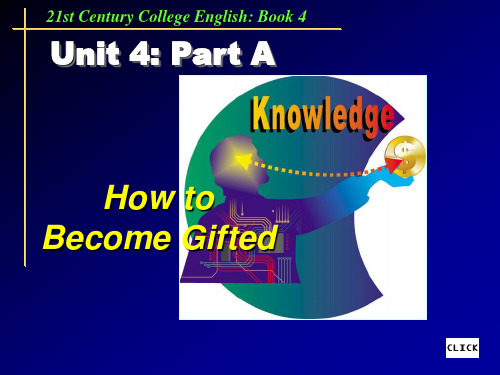
Language Points 5 Further studies showed that the special “something” in the
teacher‟s attitude was, in part, the type of work she gave the class, and in part how she presented it. But the strongest “something” was the teacher herself and her attitude toward the class and toward their ability. 6 There was an extra amount of confidence and interest in her
How to Become Gifted
Pre-Reading Activities
• Preview • Pre-Reading Listening
Pre-reading Activities Preview
Education plays a tremendously important role in all of our lives. It is an ongoing struggle, however, to make the best education possible available to all citizens. The texts in this unit present different ways in which the process of education can be improved. Text A, “How To Become Gifted” reports on a study which revealed that a teacher’s expectations can have a profound effect on the level of success that students achieve.
综合英语第四册Text_A_(Unit_1-8)课文翻译

《全新版大学英语综合教程》第四册Text A (Unit 1-8)课文翻译《全新版大学英语综合教程》第四册Text A参考译文第一单元与自然力量抗争课文A人道是骄兵必败。
就拿拿破仑和希特勒两人来说吧,他们所向披靡,便以为自己战无不胜,不可阻挡。
但俄罗斯的冰雪卫士证明他们错了。
冰雪卫士奈拉·B·斯密斯1812年,法国皇帝拿破仑·波拿巴率大军入侵俄罗斯。
他准备好俄罗斯人民会为保卫祖国而奋勇抵抗。
他准备好在俄罗斯广袤的国土上要经过长途跋涉才能进军首都莫斯科。
但他没有料到在莫斯科他会遭遇劲敌——俄罗斯阴冷凄苦的寒冬。
1941年,纳粹德国元首阿道夫·希特勒进攻当时被称作苏联的俄罗斯。
希特勒的军事实力堪称无敌。
他的战争机器扫除了欧洲绝大部分地区的抵抗。
希特勒希望速战速决,但是,就像在他之前的拿破仑一样,他得到的是痛苦的教训。
仍是俄罗斯的冬天助了苏维埃士兵一臂之力。
拿破仑发起的战役1812年春,拿破仑在俄国边境屯兵60万。
这些士兵受过良好训练,作战力强,装备精良。
这支军队被称为大军。
拿破仑对马到成功充满自信,预言要在5个星期内攻下俄国。
不久,拿破仑的大军渡过涅曼河进入俄国。
拿破仑期盼着的速决速胜迟迟没有发生。
令他吃惊的是,俄国人并不奋起抵抗。
相反,他们一路东撤,沿途焚毁庄稼和民居。
大军紧追不舍,但它的长驱直入很快由于粮草运输缓慢而停顿下来。
到了8月,法俄两军在斯摩棱斯克交战,这一战役中,双方各有上万人阵亡。
可是,俄国人仍能在自己的国土上继续后撒。
拿破仑未能取得决定性的胜利。
此刻他面临着一个重要抉择。
是继续追击俄国,军队,还是把军队驻扎在斯摩棱斯克,在那儿度过将到的冬天?拿破仑孤注一掷,决定向远在448公里之外的莫斯科进发。
1812年9月7日,法俄两军在莫斯科以西112公里外的鲍罗季诺激战。
夜幕降临时,3万名法国士兵以及4万4千名俄国士兵或伤或亡,倒在了战场上。
俄国军队再次撤往安全之处。
21世纪大学英语读写教程第四册课文翻译及课后习题的翻译(1-8)

21世纪大学英语读写教程第四册课文翻译及课后习题的翻译(1-8).txt我不奢望什么,只希望你以后的女人一个不如一个。
真怀念小时候啊,天热的时候我也可以像男人一样光膀子!unit1TEXTA谁是伟大的?迈克尔?赖恩阿尔伯特?爱因斯坦小时候在学校里的成绩很糟糕,老师们都认为他迟钝。
拿破仑?波拿巴年轻时只是法国陆军中几百名炮兵中尉中的一几乎没有受过正规教育的乔治?华盛顿,十几岁时不是受训当兵而是受训做土地测量员。
尽管他们的起步平淡无奇,但是每个人后来都为自己在历史上赢得了一席之地。
是什么使得他们变得伟大呢?是他们生来就具备一些特殊的东西?还是他们的伟大与时机掌握、献身精神和也许是一种坚定的个性更为有关?几十年来,科学家们一直在问这样的问题。
在过去几年里,他们已经发现了证据,这些证据有助于解释为什么有些人出类拔萃,而另外的人——也许同样很有才华——却被甩在了后面。
他们的发现可能对我们所有的人都有启示。
谁是伟大的?伟人的定义取决于如何衡量成功。
但标准还是有一些的。
“对人类文明作出永久性贡献的人是伟大的,”基思?西蒙顿院长说。
他是加州大学戴维斯分校的一名心理学教授,1994年出版的《伟大:谁创造历史,以及为什么》一书的作者。
但他又提醒说:“有时侯伟人并没有被载入史册。
许多女性取得了巨大成就,或者颇具影响力,但却没有得到承认。
”在这本书的写作中,西蒙顿把有关伟大人物的历史知识和遗传学、精神病学及社会科学领域的最新发现融合在了一起。
他所聚焦的伟人包括获得过诺贝尔奖、领导过伟大的国家或赢得过战争、谱写过流芳百世的交响乐或在科学、哲学、政治学或艺术上引起过革命性巨变的男性和女性。
虽然他没有一个公式来解释某些人怎样或为什么出类拔萃(其中涉及的因素太多了),但他却提出了一些共同的特点。
一种“永不屈服”的态度。
西蒙顿说,如果事业上取得巨大成就者具有什么共性的话,那就是一种持续不断地追求成功的动力。
“人们往往认为他们天生具有一些超常非凡的东西,”他解释道。
全新版21世纪大学英语读写教程4 Unit1

Part III Text B
—— Exercises
Part IV Writing
Part V Additional Theme-Related Activities
Unit 1 The American Dream 全新版21世纪大学英语读写教程BOOK 4
Objectives
Unit 1 The American Dream 全新版21世纪大学英语读写教程BOOK 4
3. What is the global dream?
I_t_is__a_d_r_e_a_m__th_a_t_r_e_fl_e_c_ts__h_u_m_a_n__a_sp_i_ra_t_io_n_s__fo_r_u_n_i_ty_,_h_a_r_m_o_n_y_, p_e_a_c_e_,_f_ri_e_n_d_s_h_ip__a_n_d_p_r_o_g_re_s_s_._P_e_o_p_l_e_s_a_l_l o_v_e_r_t_h_e_w__o_rl_d_a_r_e_ c_h_e_r_is_h_i_n_g_i_t _b_e_ca_u_s_e__w_e__a_ll_li_v_e_o_n__th_e__s_a_m_e__p_la_n_e_t._
Unit 1 The American Dream 全新版21பைடு நூலகம்纪大学英语读写教程BOOK 4
Video script:
Hello Class, I am glad that we are gathering here again to start one more journey of learning English as a foreign language. I can tell at the moment that everybody is armed with a new textbook and its corresponding1 syllabus2. And with a dream? A renewed3 one or the same one you are still chasing? In speaking of dreams, you may recall the global4 ideal of the Beijing Olympic Games. I’m sure you’ll say: “One World, One Dream”, in spite of the differences in colors, languages and races. This is a global dream which reflects human aspirations5 for unity, harmony6, peace, friendship and progress. Peoples all over the world are cherishing it because we all live on the same planet.
21世纪大学英语读写教程4第四单元课文中英对照

21世纪大学英语读写教程复习资料Unit41.在一项对教育方法的研究中,一位教师被告知她的新班中全是有非凡天赋的孩子。
“你应该使他们的成绩高于平均水平,”有人这样对她说,而到了期末果真如此----成绩超出了平均水平。
In a study of educational techniques, a teacher was told that her new class were all gifted children. "You should get above-average results from them," she was advised, and by the end of the term she was getting just that, better than average work.2.这件事的引人注目之处在于事实上这个班的学生并不超常。
他们只是一群水平中等,智商一般的学生。
对这位老师所说的这些孩子的潜力是假的。
The remarkable thing about it all was that in reality the class was not unusual. They were just an average group of students with IQs within the normal range. The teacher had been deceived about their potential.3.这项研究揭示了关于教学和孩子的诸多问题的诸多答案,但它留下的未予回答的问题更多。
它十分清晰表明的一点是,当孩子相信老师的期望是真诚的时候,他通常是不会辜负这种期望的。
This study uncovered many answers to many questions about teaching and children, but it left even more questions unanswered. One point it did make with unusual clarity is that a child will usually live up to a teacher's expectations when the child believes those expectations are honest.4.一个未予回答的问题是:老师以什么方式让学生们知道自己是特殊学生的,是能够取得优异成绩的呢?她没有对他们明说,但显然在她的态度中有某种东西使学生们确信他们是有非凡天赋的。
- 1、下载文档前请自行甄别文档内容的完整性,平台不提供额外的编辑、内容补充、找答案等附加服务。
- 2、"仅部分预览"的文档,不可在线预览部分如存在完整性等问题,可反馈申请退款(可完整预览的文档不适用该条件!)。
- 3、如文档侵犯您的权益,请联系客服反馈,我们会尽快为您处理(人工客服工作时间:9:00-18:30)。
Who Is Great?Michael RyanAs a young boy, Albert Einstein did so poorly in school that teachers thought he was slow. The young Napoleon Bonaparte was just one of hundreds of artillery lieutenants in the French Army. And the teenage George Washington, with little formal education, was being trained not as a soldier but as a land surveyor.Despite their unspectacular beginnings, each would go on to carve a place for himself in history. What was it that enabled them to become great? Were they born with something special? Or did their greatness have more to do with timing, devotion and, perhaps, an uncompromising personality?For decades, scientists have been asking such questions. And, in the past few years, they have found evidence to help explain why some people rise above, while others—similarly talented, perhaps—are left behind. Their findings could have implications for us all.Who is great? Defining who is great depends on how one measures success. But there are some criteria. "Someone who has made a lasting contribution to human civilization is great," said Dean Keith Simonton, a professor of psychology at the University of California at Davis and author of the 1994 book Greatness: Who Makes History and Why. But he added a word of caution: "Sometimes great people don't make it into the history books. A lot of women achieved great things or were influential but went unrecognized."In writing his book, Simonton combined historical knowledge about great figures with recent findings in genetics, psychiatry and the social sciences. The great figures he focused on include men and women who have won Nobel Prizes, led great nations or won wars, composed symphonies that have endured for centuries, or revolutionized science, philosophy, politics or the arts. Though he doesn't have a formula to define how or why certain people rise above (too many factors are involved), he has come up with a few common characteristics.A "never surrender" attitude. If great achievers share anything, said Simonton, it is an unrelenting drive to succeed. "There's a tendency to think that they are endowed with something super-normal," he explained. "But what comes out of the research is that there are great people who have no amazing intellectual processes. It's a difference in degree. Greatness is built upon tremendous amounts of study, practice and devotion."He cited Winston Churchill, Britain's prime minister during World War II, as an example of a risk-taker who would never give up. Thrust into office when his country's morale was at its lowest, Churchill rose brilliantly to lead the British people. In a speech following the Allied evacuation at Dunkirk in 1940, he inspired the nation when he said, "We shall not flag or fail. We shall go on to the end...We shall never surrender."Can you be born great? In looking at Churchill's role in history—as well as the roles of other political and military leaders—Simonton discovered a striking pattern: "Firstborns and only children tend to make good leaders in time of crisis: They're used to taking charge. But middle-borns are better as peacetime leaders: They listen to different interest groups better and make the necessary compromises. Churchill, an only child, was typical. He was great in a crisis, but in peacetime he was not effective—not even popular."Timing is another factor. "If you took George Washington and put him in the 20th century hewould go nowhere as a politician," Simonton declared. "He was not an effective public speaker, and he didn't like shaking hands with the public. On the other hand, I'm not sure Franklin Roosevelt would have done well in Washington's time. He wouldn't have had the radio to do his fireside chats."Can you be too smart? One surprise among Simonton's findings is that many political and military leaders have been bright but not overly so. Beyond a certain point, he explained, other factors, like the ability to communicate effectively, become more important than innate intelligence as measured by an IQ test. The most intelligent U.S. Presidents, for example—Thomas Jefferson, Woodrow Wilson and John F. Kennedy—had a hard time getting elected, Simonton said, while others with IQs closer to the average (such as Warren G. Harding) won by landslides. While political and economic factors also are involved, having a genius IQ is not necessary to be a great leader.In the sciences, those with "genius level" IQs do have a better chance at achieving recognition, added Simonton. Yet evidence also indicates that overcoming traditional ways of thinking may be just as important.He pointed to one recent study where college students were given a set of data and were asked to see if they could come up with a mathematical relation. Almost a third did. What they did not know was that they had just solved one of the most famous scientific equations in history: the Third Law of Planetary Motion, an equation that Johannes Kepler came up with in 1618.Kepler's genius, Simonton said, was not so much in solving a mathematical challenge. It was in thinking about the numbers in a unique way—applying his mathematical knowledge to his observations of planetary motion. It was his boldness that set him apart.Love your work. As a child, Einstein became fascinated with the way magnets are drawn to metal. "He couldn't stop thinking about this stuff," Simonton pointed out. "He became obsessed with problems in physics by the time he was 16, and he never stopped working on them. It's not surprising that he made major contributions by the time he was 26.""For most of us, it's not that we don't have the ability," Simonton added, "it's that we don't devote the time. You have to put in the effort and put up with all the frustrations and obstacles."Like other creative geniuses, Einstein was not motivated by a desire for fame, said Simonton. Instead, his obsession with his work was what set him apart.Where such drive comes from remains a mystery. But it is found in nearly all creative geniuses—whether or not their genius is acknowledged by contemporaries."Emily Dickinson was not recognized for her poetry until after her death," said Simonton. "But she was not writing for fame. The same can be said of James Joyce, who didn't spend a lot of time worrying about how many people would read Finnegans Wake."Today, researchers have evidence that an intrinsic passion for one's work is a key to rising above. In a 1985 study at Brandeis University conducted by Teresa Amabile, now a professor of business administration at Harvard University, a group of professional writers—none famous—were asked to write a short poem. Each writer was then randomly placed in one of three groups: One group was asked to keep in mind the idea of writing for money; another was told to think about writing just for pleasure; and a third group was given no instruction at all.The poems then were submitted anonymously to a panel of professional writers for evaluation. The poetry written by people who thought about writing for money ranked lowest. Those who thought about writing just for pleasure did the best. "Motivation that comes from enjoying thework makes a significant difference, "Amabile said.(1 214 words)The Gratitude We NeedA.J. CroninOn a fine afternoon in New York, I got into a taxi. From the driver's expression and the way he slammed in his gears, I could tell that he was upset. I asked him what was the trouble. "I've got good reason to be sore," he growled. "One of my fares left a wallet in my cab this morning. Nearly three hundred bucks in it. I spent more than an hour trying to trace the guy. Finally I found him at his hotel. He took the wallet without a word and glared at me as though I'd meant to steal it." "He didn't give you a reward?" I exclaimed."Not a cent. But it wasn't the dough I wanted..." he fumbled, then exploded, "If the guy had only said something..."Because his helpful, honest act had not been appreciated, that cabdriver's day was poisoned, and I knew he would think twice before rendering a similar service. The need for gratitude is something we all feel, and denial of it can do much to harm the spirit of kindness and cooperation.During World War II a mother in Cincinnati received a letter from her son in the army in which he spoke of a woman in a village in Normandy who had taken him into her home when he was wounded and hungry, and hidden him from the Germans. Later on, unhappily, the boy was killed in the Ardennes offensive. Yet the mother was moved by an irresistible intention. She saved up for two years, crossed the Atlantic and located the village referred to by her son. After many inquiries, she found the woman who had sheltered her son—the wife of an impoverished farmer—and pressed a package into her hand. It was the gold wristwatch her son had received on his graduation, the only object of real value the boy had ever possessed. The mother's act of gratitude so touched people's hearts that it has become something of a legend in and around the village. It has done more than fine speeches to foster good feeling toward Americans.Gratitude is the art of receiving gracefully, of showing appreciation for every kindness, great and small. Most of us do not fail to show our pleasure when we receive hospitality, gifts and obvious benefits, but even here we can perfect our manner of showing gratitude by making it as personal and sincere as possible. Recently, when touring in southern Italy with my wife, I sent to a friend in Connecticut several bottles of a local wine which had taken our fancy. It was a trifling gift, yet to our surprise, instead of the conventional letter of thanks, we receive a phonograph record. When we played it, we heard our friend's voice speaking after dinner, describing how he and his guests had enjoyed the wine and thanking us for our thoughtfulness. It was pleasant to have this unusualproof that our gift had been appreciated.Gratitude is sometimes more than a personal affair. My son, studying medicine at McGill University, told me of a patient brought into hospital in Montreal whose life was saved by a blood transfusion. When he was well again he asked: "Isn't there any way I can discover the name of the donor and thank him?" He was told that names of donors are never revealed. A few weeks after his discharge he came back to give a pint of his own blood. Since then he has returned again and again for the same purpose. When a surgeon commented on this splendid record of anonymous service, he answered simply: "Someone I never knew did it for me. I'm just saying 'thanks'".It is a comforting thought that gratitude can be not merely a passing sentiment but a renewal which can, in some instances, persist for a lifetime. A husband who recalls appreciatively some generous or unselfish act on his wife's part, or a wife who never forgets the gifts her husband has given her, does much to keep the domestic wheels spinning smoothly. W.H. Hudson, British author and naturalist, has written: "One evening I brought home a friend to share our usual evening meal. Afterward he said to me:‘You are fortunate to have a wife who, despite ill health and children to look after, cooks such excellent meals.' That tribute opened my eyes and taught me to show gratitude for my wife's day-to-day heroism, which I had hitherto taken for granted."It is, above all, in the little things that the grace of gratitude should be most employed. The boy who delivers our paper, the milkman, the mailman, the barber, the waitress at a restaurant, the elevator operator—all oblige us in one way or another. By showing our gratitude we make routine relationships human and render monotonous tasks more agreeable.A patient of mine in London who worked as a bus conductor once confided to me, "I get fed up with my job sometimes. People grumble, bother you, haven't got the right change for their tickets. But there's one lady on my bus morning and evening, and she always thanks me in a particularly friendly way when I take her ticket. I like to think she's speaking for all the passengers. It helps me to keep smiling."Arnold Bennett had a publisher who boasted about the extraordinary efficiency of his secretary. One day Bennett said to her, "Your employer claims that you are extremely efficient. What is your secret?" "It's not my secret," the secretary replied. "It's his." Each time she performed a service, no matter how small, he never failed to acknowledge it. Because of that she took infinite pains with her work.Some persons refrain from expressing their gratitude because they feel it will not be welcome. A patient of mine, a few weeks after his discharge from the hospital, came back to thank his nurse. "I didn't come back sooner," he explained, "because I imagined you must be bored to death with people thanking you.""On the contrary," she replied, "I am delighted you came. Few realize how much we need encouragement and how much we are helped by those who give it."Gratitude is something of which none of us can give too much. For on the smiles, the thanks we give, our little gestures of appreciation, our neighbors build up their philosophy of life.(1 069 words)How to Change Your Point of ViewCaroline SeebohmDr. Edward Jenner was busy trying to solve the problem of smallpox. After studying case after case, he still found no possible cure. He had reached an impasse in his thinking. At this point, he changed his tactics. Instead of focusing on people who had smallpox, he switched his attention to people who did not have smallpox. It turned out that dairymaids apparently never got the disease. From the discovery that harmless cowpox gave protection against deadly smallpox came vaccination and the end of smallpox as a scourge in the western world.We often reach an impasse in our thinking. We are looking at a problem and trying to solve it and it seems there is a dead end. It is on these occasions that we become tense, we feel pressured, overwhelmed, in a state of stress. We struggle vainly, fighting to solve the problem.Dr. Jenner, however, did something about this situation. He stopped fighting the problem and simply changed his point of view—from his patients to dairy maids. Picture the process going something like this: Suppose the brain is a computer. This computer has absorbed into its memory bank all your history, your experiences, your training, your information received through life; and it is programmed according to all this data. To change your point of view, you must reprogramme your computer, thus freeing yourself to take in new ideas and develop new ways of looking at things. Dr. Jenner, in effect, by reprogramming his computer, erased the old way of looking at his smallpox problem and was free to receive new alternatives.That's all very well, you may say, but how do we actually do that?Doctor and philosopher Edward de Bono has come up with a technique for changing our point of view, and he calls it Lateral Thinking.The normal Western approach to a problem is to fight it. The saying, "When the going gets tough, the tough get going," is typical of this aggressive attitude toward problem-solving. No matter what the problem is, or the techniques available for solving it, the framework produced by our Western way of thinking is fight. Dr. de Bono calls this vertical thinking; the traditional, sequential, Aristotelian thinking of logic, moving firmly from one step to the next, like toy blocks being built one on top of the other. The flaw is, of course, that if at any point one of the steps is not reached, or one of the toy blocks is incorrectly placed, then the whole structure collapses. Impasse is reached, and frustration, tension, feelings of fight take over.Lateral thinking, Dr. de Bono says, is a new technique of thinking about things—a technique that avoids this fight altogether, and solves the problem in an entirely unexpected fashion.In one of Sherlock Holmes's cases, his assistant, Dr. Watson, pointed out that a certain dog was of no importance to the case because it did not appear to have done anything. Sherlock Holmes took the opposite point of view and maintained that the fact the dog had done nothing was of the utmost significance, for it should have been expected to do something, and on this basic he solved the case.Lateral thinking sounds simple. And it is. Once you have solved a problem laterally, you wonder how you could ever have been hung up on it. The key is making that vital shift in emphasis, that sidestepping of the problem, instead of attacking it head-on.Dr. A. A. Bridger, psychiatrist at Columbia University and in private practice in New York, explains how lateral thinking works with his patients. "Many people come to me wanting to stop smoking, for instance," he says. "Most people fail when they are trying to stop smoking because they wind up telling themselves, 'No, I will not smoke; no, 1 shall not smoke; no, I will not; no, I cannot...' It's a fight and what happens is you end up smoking more.""So instead of looking at the problem from the old ways of no, and fighting it, I show them a whole new point of view—that you are your body's keeper, and your body is something through which you experience life. If you stop to think about it, there's really something helpless about your body. It can do nothing for itself. It has no choice, it is like a baby's body. You begin then a whole new way of looking at it—‘I am now going to take care of myself, and give myself some respect and protection, by not smoking.'“There is a Japanese parable about a donkey tied to a p ole by a rope. The rope rubs tight against his neck. The more the donkey fights and pulls on the rope, the tighter and tighter it gets around his throat—until he winds up dead. On the other hand, as soon as he stops fighting, he finds that the rope gets slack, he can walk around, maybe find some grass to eat...That's the same principle: The more you fight something the more anxious you become—the more you're involved in a bad pattern, the more difficult it is to escape pain."Lateral thinking," Dr. Bridger goes on, "is simply approaching a problem with what I would call an Eastern flanking maneuver. You know, when a zen archer wants to hit the target with a bow and arrow, he doesn't concentrate on the target, he concentrates rather on what he has in his hands, so when he lets the arrow go, his focus is on the arrow, rather than the target. This is what an Eastern flanking maneuver implies—instead of approaching the target directly, you approach it from a sideways point of view—or laterally instead of vertically.""I think the answer lies in that direction," affirms Dr. Bridger. "Take the situation where someone is in a crisis. The Chinese word for crisis is divided into two characters, one meaning danger and the other meaning opportunity. We in the Western wor ld focus only upon the ‘danger' aspect of crisis. Crisis in Western civilization has come to mean danger, period. And yet the word can also mean opportunity. Let us now suggest to the person in crisis that he cease concentrating so upon the dangers involved and the difficulties, and concentrate instead upon the opportunity—for there is always opportunity in crisis. Looking at a crisis from an opportunity point of view is a lateral thought."(1 100 words)How to Become GiftedJulius and Barbara FastIn a study of educational techniques, a teacher was told r that her newclass were all gifted children. "You should get above-average results from them," she was advised, and by the end of the term she was getting just that, better than average work.The remarkable thing about it all was that in reality the class was not unusual. They were just an average group of students with IQs within the normal range. The teacher had been deceived about their potential.This study uncovered many answers to many questions about teaching and children, but it left even more questions unanswered. One point it did make with unusual clarity is that a child will usually live up to a teacher's expectations when the child believes those expectations are honest. An unanswered question was: In what way did the teacher communicate to the students that they were special and could do superior work? She didn't tell them that in so many words, but obviously something about her attitude convinced the students that they were gifted.Further studies showed that the special "something" in the teacher's attitude was, in part, the type of work she gave the class, and in part how she presented it. But the strongest "something" was the teacher herself and her attitude toward the class and toward their ability.There was an extra amount of confidence and interest in her voice that said, "You're bright children." There was a constant reassuring tone that told them they would do well, very well. The children picked up these signals and reacted positively to them.When a student's work did not measure up to the teacher's expectations, as often happened, the student was not treated with disappointment, anger, or annoyance. Instead, the teacher assumed that this was an exception, an accident, a bad day, a momentary slip — and the student believed her and felt reassured. The next time around, he tried harder, determined to live up to what the teacher knew he could do.The exact part of communication that tells a child, "I expect the best," is difficult to pinpoint. In part it consists of a level tone showing assurance, a lack of verbal impatience, an absence of negative qualities such as irony, put-downs, and irritation. The teacher who expects the best asks her questions with conviction, knowing the answers she gets will be right, and the child picks up that conviction.Most of this is transmitted through the voice, but a surprising amount is in the attitude, in touch, and in facial expression.An experiment similar to the one done with "gifted" children was done with "gifted" mice. A scientist was given a group of ordinary mice, but told that they were a special breed, trained to run a maze in record time. Working with these mice, the scientist found that they did learn faster than other mice and did run the maze more quickly.But mice know nothing of our language. How was the scientist able to communicate his expectations to them? An examination of all the variables in the test concluded that the unusually good results were due to the way he had handled the mice, the way he talked to them and the tone, the confidence, the reassurance, and the certainty in his voice. They absorbed all the messages and performed accordingly!In a broader view of both these experiments, the teacher and the scientist used a principle common to all societies at all levels — the principle of labeling. All our expectations are prejudiced, and we have very different expectations for different people, even on a national level. We think of people in terms of national characteristics. We expect Americans to be greedy, after the big buck, and we label them that way in our minds. We label Germans neat and orderly, English cold, distant, and reserved, Italians emotional, Japanese polite——and so it goes. We pin a very narrow label on a very broad, far from homogeneous group. We do it on racial levels too. Blacks are musical, Indians are stoic, Orientals inscrutable. We even label the sexes — men are aggressive, womenpassive.On a family basis, the labels are sometimes attached by the neighbors. "Those Joneses are trash...always on welfare." Or the label may be attached by the family itself. "We Smiths would rather go hungry than ask for government help!" The Smith boy, growing up with this label of awesome independence, lives up to it as readily as the Jones girl lives up to her label. "They all think we're trash? I'll act like trash!"The label may be less inclusive, even sexist. One family might say proudly, "The men in our family are always professionals." When Bill, a son in this family finds that carpentry is the work he loves best, he faces a family conflict — and a conflict with himself. His inner strength may allow him to go through with his own desires and become a carpenter, but then he knows that he hasn't lived up to the family label and he goes through life with a sense of guilt. He may even create his own label. "I'm a failure, really." It doesn't matter that Bill is a success in his field, that in time he owns his own business and makes more money than his brother Bob, who became a lawyer. Bill is still not a professional man, and as a result his inner label still reads failure. Labeling within a family starts very early. Before the baby understands verbal language, he responds to body language and indirect communication. He senses the love in his parents' voice before he understands the words, and he also senses the rejection, indifference, fear, or hostility, and he reacts to those emotions too.If he's treated with love and gentleness, he responds with both emotions. Later, when he understands speech, he accepts his label. Jimmy is the nice one in the family, or Sally, who's been a difficult baby, earns the label of troublemaker. Each child, along with his given name, picks up a label. She's the clever one. He's the pushy one. Norman is always late. Betty is so hard to love. Barbara is cold. Jack is wild. Natalie is sweet, and so on. The labels may reflect reality. Natalie may be sweet, but as often as not the reality has been imposed on the child by the label. If Natalie hears that she is sweet often enough, she begins to act sweet. You tend to live up to your label.In the same way, the students in the teaching experiment were labeled bright, and they managed to be bright, to work beyond their ordinary ability.(1 117 words)Prison StudiesMalcolm XMany who today hear me somewhere in person, or on television, or those who read something I've said, will think I went to school far beyond the eighth grade. This impression is due entirely to my prison studies.It had really begun back in the Charlestown Prison, when Bimbi first made me feel envy of his stock of knowledge. Bimbi had always taken charge of any conversation he was in, and I had tried to emulate him. But every book I picked up had few sentences which didn't contain anywhere from one to nearly all of the words that might as well have been in Chinese. When I just skipped those words, of course, I really ended up with little idea of what the book said. So I had come to the Norfolk Prison Colony still going through only book-reading motions. Pretty soon, I would have quit even these motions, unless I had received the motivation that I did.I saw that the best thing I could do was get hold of a dictionary—to study, to learn some words. I was lucky enough to reason also that I should try to improve my penmanship. It was sad. I couldn't even write in a straight line. It was both ideas together that moved me to request a dictionary along with some tablets and pencils from the Norfolk Prison Colony school.I spent two days just thumbing uncertainly through the dictionary's pages. I've never realized so many words existed! I didn't know which words I needed to learn. Finally, to start some kind of action, I began copying.In my slow, painstaking, ragged handwriting, I copied into my tablet everything printed on that first page, down to the punctuation marks.I believe it took me a day. Then, aloud, I read back, to myself, everything I've written on the tablet. Over and over, aloud, to myself, I read my own handwriting.I woke up the next morning, thinking about those words—immensely proud to realize that not only had I written so much at one time, but I've written words that I never knew were in the world. Moreover, with a little effort, I also could remember what many of these words meant. I reviewed the words whose meanings I didn't remember. Funny thing, from the dictionary's first page right now, that "aardvark" springs to my mind. The dictionary had a picture of it, a long-tailed, long-eared, burrowing African mammal, which lives off termites caught by sticking out its tongue as an anteater does for ants.I was so fascinated that I went on—I copied the dictionary's next page. And the same experience came when I studied that. With every succeeding page, I also learned of people and places and events from history. Actually the dictionary is like a miniature encyclopedia. Finally the dictionary's A section had filled a whole tablet—and I went on into the B's. That was the way I started copying what eventually became the entire dictionary. I went a lot faster after so much practice helped me to pick up handwriting speed. Between what I wrote in my tablet, and writing letters, during the rest of my time in prison I would guess I wrote a million words.I suppose it was inevitable that as my word-base broadened, I could for the first time pick up a book and read and now begin to understand what the book was saying. Anyone who has read a great deal can imagine the new world that opened. Let me tell you something; from then until I left that prison, in every free moment I had, if I was not reading in the library, I was reading on my bunk. You couldn't have got me out of books with a wedge. Between Mr. Muhammad's teachings, my correspondence, my visitors, and my reading of books, months passed without my even thinking about being imprisoned. In fact, up to then, I never had been so truly free in my life...As you can imagine, especially in a prison where there was heavy emphasis on rehabilitation, an inmate was smiled upon if he demonstrated an unusually intense interest in books. There was a sizable number of well-read inmates, especially the popular debaters. Some were said by many to be practically walking encyclopedias. They were almost celebrities. No university would ask any student to devour literature as I did when this new world opened to me, of being able to read and。
